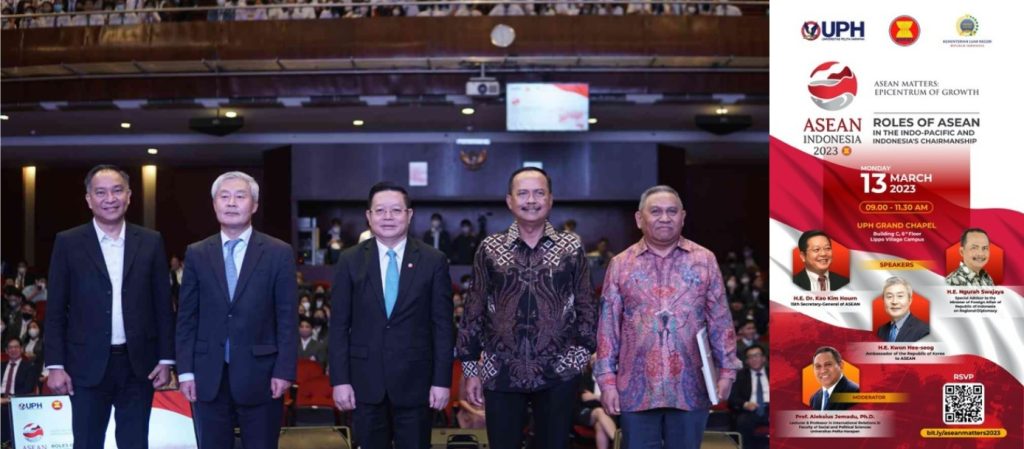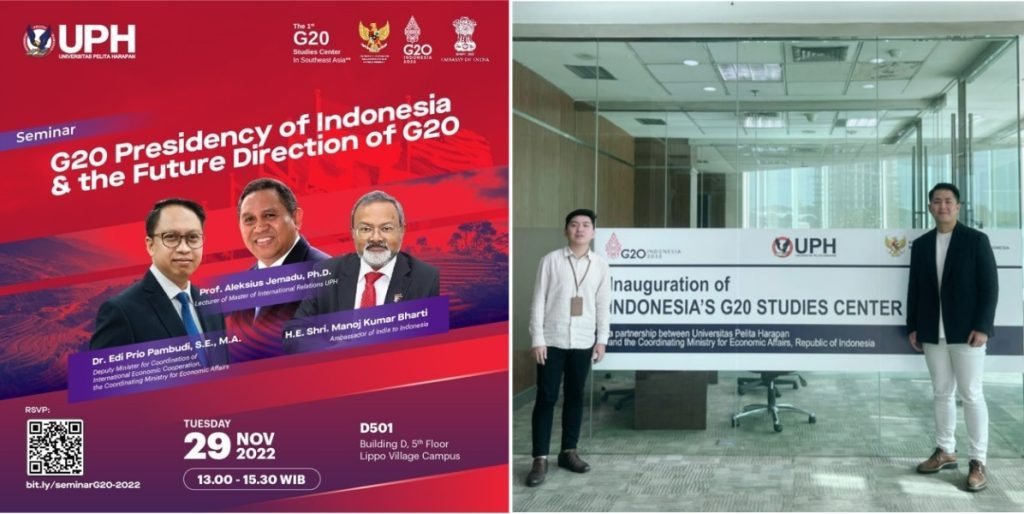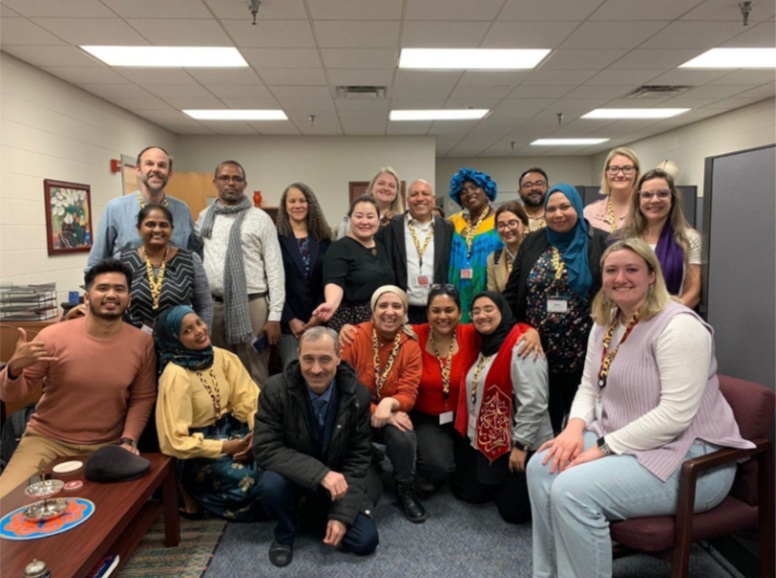
SDG 17: PARTNERSHIPS FOR THE GOALS
Universitas Pelita Harapan (UPH) supports SDG 17: Partnerships for the Goals by fostering collaboration with various stakeholders to advance sustainable development. The university actively engages with local and global partners, including governments, NGOs, and industry leaders, to address pressing issues and drive impactful solutions. UPH participates in joint research projects, community development initiatives, and international conferences, leveraging collective expertise and resources. Through these partnerships, UPH enhances its educational programs, expands its outreach efforts, and contributes to the achievement of global goals. By building strong, collaborative networks, UPH helps advance shared objectives for sustainable development and mutual progress.
RELATIONSHIPS TO SUPPORT THE GOALS
RELATIONSHIPS WITH REGIONAL NGOS AND GOVERNMENT FOR SDG POLICY
Universitas Pelita Harapan (UPH) plays an active role in advancing the SDGs, especially through collaboration with governments and other stakeholders such as Non-Governmental Organizations (NGOs). Starting from 2021 until 2023, UPH’s Faculty of Design joined Dinas Pemukiman Rakyat dan Kawasan Pemukiman (DPRKP) of the DKI Jakarta Provincial Government and DAG (Design as Generator) community in formulating several policy outcomes.

- “Standar Operasional Prosedur 2022: Standar Teknis Peningkatan Kualitas Pemukiman” (Operational Standard Procedure 2022: Technical Standard for Settlement Quality Improvement

- “Manual Pencegahan Tumbuh Kembang Permukiman Kumuh 2023: Konsep & Strategi, Program Kerja, Monitoring & Evaluasi” (Manual for Preventing the Growth and Development of Slums 2023: Concepts & Strategies, Work Program, Monitoring & Evaluation).
The manual addressed Sustainable Development Goal (SDG) 11, which focuses on creating inclusive, safe, resilient, and sustainable cities and human settlements. Established through the partnership, the manual aims to ensure that the standards are aligned with both international SDG targets and the specific needs of local communities. UPH’s academic expertise and research capabilities contribute to the development of evidence-based policies, while also ensuring community voices are heard and that the most vulnerable populations benefit from urban development initiatives. The involvement from local government is critical to the implementation and enforcement of these standards, making the partnership integral to policy success.
By working together, UPH and the Provincial Government of DKI Jakarta contribute to enhancing urban living conditions, addressing issues such as affordable housing, infrastructure improvements, and disaster resilience. This holistic approach not only promotes SDG 11 but also strengthens regional policy coherence and sustainable urban growth in Indonesia.
Collaboration between UPH faculty members and Regional Government of DKI Jakarta continues until the following years: Dr. Martin L. Katoppo: Dedikasikan Inovasi Desain untuk Pemberdayaan Masyarakat – UPH | Universitas Pelita Harapan – UPH | Universitas Pelita Harapan.
CROSS SECTORAL DIALOGUE ABOUT SDGS
Universitas Pelita Harapan (UPH) reaffirmed its dedication to global sustainable development with a conference on March 13, 2023, titled “ASEAN Matters: Epicentrum of Growth – Roles of ASEAN in the Indo-Pacific and Indonesia’s Chairmanship,” held at the Grand Chapel UPH. This high-profile event underscored UPH’s commitment to fostering cross-sectoral dialogue on Sustainable Development Goals (SDGs) and advancing regional and global sustainability initiatives.

The event featured a distinguished lineup of speakers, including H.E. Kao Kim Hourn, Secretary-General of ASEAN; H.E. I Gede Ngurah Swajaya, Special Staff to the Minister of Foreign Affairs for Regional Diplomacy; and H.E. Kwon Hee-seog, Ambassador of Korea to ASEAN. The discussion was guided by Prof. Aleksius Jemadu, Ph.D., a prominent professor of International Relations at UPH’s Faculty of Social and Political Sciences.
Dr. Kao Kim Hourn’s address centered on the 6Ps—Peace, Prosperity, Planet, People, Partnership, and Potentials—highlighting their significance in achieving the SDGs. His presentation emphasized the necessity for collaborative and cross-sectoral strategies to address these key areas effectively.
Ambassador Kwon Hee-seog spoke about the pressing challenges ASEAN faces, including maritime disparities, climate change, natural disasters, and global pandemics. His insights illustrated the critical need for ASEAN to adopt comprehensive, cross-sectoral approaches to meet these challenges and promote sustainable development.
Dr. I Gede Ngurah Swajaya shared Indonesia’s priorities as the ASEAN Chair for 2023, focusing on how Indonesia plans to steer ASEAN’s efforts towards impactful SDG initiatives. His discussion highlighted Indonesia’s strategic approach to enhancing regional cooperation and addressing global issues through diplomatic and collaborative means.
The event was a testament to UPH’s proactive role in contributing to global sustainable development. By bringing together key stakeholders and thought leaders to discuss ASEAN’s role and Indonesia’s chairmanship, UPH showcased its dedication to advancing the SDGs and addressing critical global challenges. This event exemplifies UPH’s ongoing commitment to supporting sustainable growth and fostering meaningful dialogue on pressing global issues.
INTERNATIONAL COLLABORATION DATA GATHERING FOR SDG
Universitas Pelita Harapan (UPH) has significantly contributed to international collaboration on data gathering for the Sustainable Development Goals (SDGs) through the establishment of its G20 Indonesia Studies Center. This center, created in collaboration with the Coordinating Ministry for Economic Affairs of the Republic of Indonesia to support Indonesia’s G20 Presidency 2022, exemplifies UPH’s commitment to SDG 17: Partnerships for the Goals, by fostering partnerships that enable robust research, data collection, and policy development aligned with global development goals.
The G20 Studies Center served as a crucial platform for gathering and analyzing data related to the G20 summit discussions, with a particular focus on sustainability and economic policies. UPH participated in key activities such as the Sherpa G20 meetings and other high-level forums, contributing to policy discourse and the understanding of key global challenges. Moreover, UPH facilitated internships for its students at the G20 Secretariat, providing them with real-world experience in global governance and development issues.
Using its academic resources and collaborating with governmental bodies, UPH has played a pivotal role in collecting and analyzing data that informs both national and international efforts towards achieving the SDGs. This effort is done through research and publication outcome, such as the publication led by a lecturer from the Faculty of Social and Political Sciences, titled “The Role of Media in Amplifying G20 Indonesia Presidency Issues on 14 Online Media”. This initiative highlights the university’s leadership in supporting research-driven solutions to complex global challenges through effective partnerships.

COLLABORATION FOR SDG BEST PRACTICE
A lecturer from UPH’s Faculty of Education, Michael Recard Sihombing, represented Indonesia in the Exchange Program: Using Service Learning to Teach 21st Century Skills to English Language Learners, a program of the United States Department of State’s Bureau of Educational and Cultural Affairs Office of English Language Programs, implemented in cooperation with FHI 360, hosted at Indiana University Indianapolis.
His participation emphasized how global collaborations can enhance teaching methodologies, aligning with SDG 4: Quality Education. Michael was exposed to best practices in service-learning (SL), particularly its integration into English language education. The exchange provided a platform for him to explore how SL can be adapted to the Indonesian context—an innovative approach for his home institution, UPH.
Through hands-on experiences and collaboration with SL experts like Dr. Ulla Connor and Matthew Hume, Michael developed a project aimed at fostering community-based learning in Indonesia. This initiative supports UPH’s commitment to improving educational outcomes by combining academic learning with community service. Michael’s experience at IUPUI not only broadened his perspective on SL but also equipped him with the tools to implement this teaching approach back at UPH, contributing significantly to achieving SDG 4 by promoting inclusive and equitable education.
This cross-institutional exchange showcases how educators like Michael can drive positive change in their home countries, creating impactful, student-centered learning experiences.

The collaboration resulted in a journal article publication: https://journals.iupui.edu/index.php/intesol/article/view/27617.
Further story on Michael’s journey could also be accessed through: https://liberalarts.indianapolis.iu.edu/centers/icic/bucket-list-opportunity-michael-recard-sihombing-indonesia/.
COLLABORATION WITH NGOs FOR SDGS
As an effort to integrate the social responsibility aspect into the curriculum, students of UPH are required to conduct Service Learning Projects for several foundational courses during study. In doing so, UPH partners with more than 60 organizations, consisting of non-profit organizations, foundations, and schools to foster holistic student development. These projects are directed to drive sustainable development through education, such as through capacity building efforts, conducting informal learning, and various other series of assistance in the local community. At the beginning of the 2022/2023 academic year, UPH added 36 new partner institutions to support extend the impact of these projects.
A transformative project titled “Service as an Act of Love” led by Faculty of Law students is one example of a Service Learning Project, that was completed as on a voluntary basis, as part of a grading component for their Christian Worldview module. This project was conducted in collaboration with Rumah Singgah Kasih Ampera in March 2023 to supporting marginalized communities, particularly children with special needs and abandoned elderly individuals—in line with reduced inequality as outlined in SDG 10.
RSKA, a privately-run non-profit organization founded in 2011, provides care to children with mental and physical disabilities and elderly individuals without family support. The foundation’s limited resources, exacerbated by the pandemic, made this partnership especially meaningful. The students’ efforts offered a much-needed boost to RSKA’s residents, bringing joy and a sense of inclusion.
Considering the needs from RSKA, the project featured a series of structured activities designed to foster creativity, enhance motor skills, and provide emotional support. Key activities included creative workshops, storytelling sessions, and skill-based learning, all aimed at empowering the residents with tools for self-expression and personal growth.
This initiative reflects the growing role of youth-driven projects in addressing social inequalities. It highlights the power of compassion, creativity, and community collaboration in creating a more inclusive society where everyone can thrive. Through their work, the students exemplified how small actions can drive significant social change
EDUCATION FOR THE SDGS
EDUCATION FOR SDGS COMMITMENT TO MEANINGFUL EDUCATION
The vision and mission of Universitas Pelita Harapan (UPH) is established under the basis of providing a holistic education that harmoniously blends academic rigor with character development and spiritual enrichment. The institution endeavors to shape students and alumni into conscientious citizens, attuned to the dynamic global environment and the imperative of sustainability. Consequently, graduates are anticipated to embody these principles, thereby effecting constructive social and community contributions.
Previously, global citizenship is integrated into the third point of UPH’s 2020 Educational Framework with the common goal to produce: (1) broad, problem-solving, innovative scholars; (2) godly, visionary, transformed leaders; and (3) compassionate, service, engaged citizens.
UPH’s commitment is further reflected through the most recent 5-year Strategic Plan (2021-2025) which emphasizes on four destination statements including: international recognition, scale and reach, quality & innovative delivery, and sustainability. Consequently, the university’s five core research areas – life sciences, technology, business and entrepreneurship, education, and social sciences – all explicitly focus on sustainable development. This emphasis on sustainability aligns with the university’s 5-year strategic plan ensuring all academic and non-academic activities remain relevant in the ever-changing global landscape.
EDUCATION FOR SDGs: SPECIFIC COURSES ON SUSTAINABILITY

Universitas Pelita Harapan (UPH) is demonstrating its commitment to sustainability by offering over 400 courses across 13 faculties that address various Sustainable Development Goals (SDGs). These courses span a wide range of disciplines, ensuring that students from diverse academic backgrounds can integrate sustainability into their learning journey. A few relevant courses includes but not limited to “Bioteknologi Lingkungan”, “Environmental Law”, “International Development”, and “Sustainability and Social Value”. The numbers of courses addressing specific SDG targets can be seen through the following figure, while full list of courses could be seen here:
| SDG 1 | 1 |
| SDG 2 | 11 |
| SDG 3 | 104 |
| SDG 4 | 32 |
| SDG 5 | 1 |
| SDG 6 | 4 |
| SDG 7 | 4 |
| SDG 8 | 54 |
| SDG 9 | 15 |
| SDG 10 | 3 |
| SDG 11 | 4 |
| SDG 12 | 9 |
| SDG 13 | 6 |
| SDG 14 | 3 |
| SDG 15 | 13 |
| SDG 16 | 109 |
| SDG 17 | 35 |
| Total | 408 |
The university’s proactive stance on sustainability education aligns with global efforts to tackle challenges like good health and well-being, quality education, economic growth, as well as peace and justice. By incorporating sustainability across its academic programs, UPH empowers students to make a meaningful impact in their respective fields, fostering a generation of professionals ready to contribute to a more sustainable future.
EDUCATION FOR SDGs IN THE WIDER COMMUNITY
As an Indonesian higher education institution, Universitas Pelita Harapan (UPH) actively engages with local communities and the broader society to advance Sustainable Development Goals (SDGs). UPH integrates education, research, and community service (Tri Dharma) to address societal challenges. Through its Community Service Program (PkM), UPH collaborates with local governments, NGOs, and communities to implement initiatives that promote health, education, and environmental sustainability.
One of its key initiatives is providing health education for refugees on non-communicable diseases (NCDs), such as hypertension, heart disease, and diabetes mellitus. Through its Community Service Program (PkM), UPH’s Faculty of Nursing, in collaboration with the Jesuit Refugee Service (JRS) Indonesia, organized two online education outreach programs in May and June of 2023.

The program aimed to enhance refugees’ knowledge about the prevention and management of NCDs, which are often undetected and poorly managed among refugees. The education was delivered via Zoom in three languages (Indonesian, English, and Arabic) to ensure clear understanding. The first session focused on hypertension and heart disease, while the second session covered diabetes mellitus.
Participants came from 16 countries, including Yemen, Eritrea, and Afghanistan, ranging in age from 15 to 59 years. Evaluation results showed that more than 50% of the participants found the sessions very beneficial and enjoyable. They learned how to prevent hypertension, heart attacks, and diabetes, as well as the importance of maintaining healthy habits.
This program is a clear example of UPH’s contribution to educating the community, especially refugees, in order to achieve Sustainable Development Goal (SDG) 3, which focuses on good health and well-being, by improving health literacy and access to much-needed information.
SUSTAINABLE LITERACY
Universitas Pelita Harapan (UPH) is conducting a survey to assess students’ literacy on sustainability. The survey aims to:
- Evaluate students’ understanding of sustainability concepts.
- Explore students’ attitudes towards sustainable practices and behaviors.
- Identify gaps in knowledge and awareness that can inform educational strategies at UPH.
Participants’ responses will be used to assess the overall sustainability literacy of the student body, helping UPH to align its educational programs and campus initiatives with sustainability goals, in support of its commitment to the United Nations’ Sustainable Development Goals (SDGs). The Knowledge Assessment on Sustainability was conducted using a tool developed by Zwickle, A., & Jones, K. (2018), as described in Sustainability Knowledge and Attitudes—Assessing Latent Constructs found in the Handbook of Sustainability and Social Science Research. This tool is designed to measure knowledge and attitudes toward sustainability through a series of questions that capture various latent constructs related to environmental, social, and economic aspects of sustainability.
Participation in this survey is voluntary, and the insights gained will contribute to shaping a more sustainable academic environment at UPH. While the scores of sustainability literacy can be significantly improved, this survey provides a steppingstone for UPH to decide future strategies in advancing sustainability initiatives and knowledge.

